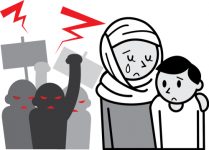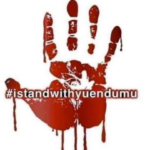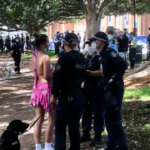Muslims Are the Main Targets of Hate Crimes in NSW

A recent study by the Sydney Institute of Criminology (SIC) has found that the overwhelming majority of religiously motivated hate crime in New South Wales is perpetrated against Muslim people.
The SIC’s Professor Gail Mason made the finding by looking at data stored by the NSW Police Force for crimes of bias reported from July 2013 to June 2016 – which was the first time such data was kept.
She found that an average of one crime of bias per day is reported in our state, the most common being assault, property damage and criminal threats and intimidation.
Over the period, crimes motivated by racial/ethnic and religious bias comprised 81% of all crimes of bias reported to police. The next most common were crimes based on sexual orientation or gender identity, which made up 14%.
The most commonly-reported victim race/ethnicity were overwhelmingly against ‘Muslims’, comprising 73%, followed by ‘Jews’, 14%.
Racial Discrimination Laws
On 21 June 2018, the NSW Parliament passed the Crimes Amendment (Publicly Threatening and Inciting Violence) Bill 2018.
The Bill inserted section 93Z into the Crimes Act 1900 (NSW) which prescribes a maximum penalty of 3 years in prison and/or a fine of $11,000 for publicly threatening or inciting violence on the grounds of race, religion, sexual orientation, gender identity or intersex or HIV/AIDS status.
The offence extends to all forms of public publications, including social media posts.
NSW Attorney-General Mark Speakman issued a press release at the time to the effect that the law seeks to strike a balance between enabling free speech and discouraging the incitement of violence.
“These laws will help protect individuals and groups from being targeted by cowards who seek to cause physical harm to innocent people,” he stated.
“We’re not saying people can’t have opinions or express their views, but if they cross the line into threatening and inciting violence they will not go unpunished.”
Definitions
The new section defines ‘race’ as including colour, nationality, descent and ethnic, ethno-religious or national origin.
‘Religious belief or affiliation’ means holding or not holding a religious belief or view.
‘Sexual orientation’ means a person’s sexual orientation towards persons of the same sex, or a different sex, or of the same sex and persons of a different sex.
‘Gender identity’ is defined as the gender related identity, appearance or mannerisms or other gender related characteristics of a person (whether by way of medical intervention or not), with or without regard to the person’s designated sex at birth.
While the definition of “intersex status” includes… having physical, hormonal or genetic features that are:
- neither wholly female nor wholly male, or
- a combination of female and male, or
- neither female nor male.
An essential element of the offence is that it is “public act”, which includes:
- Any form of communication (including online communications) made to the public
- Any conduct observable by the public (such as wearing clothes or displaying signs with slogans on them)
- The distribution or dissemination of any matter to the public.
The section makes clear that “an act may be a public act even if it occurs on private land”.
DPP approval
Proceedings under section 93Z can only be commenced with the approval of the state Director of Public Prosecutions (DPP).
According to Mr Speakman, this requirement is intended “to ensure that the offence is only prosecuted where appropriate, in accordance with the Prosecution Guidelines”.
Police inaction
Despite apparent moves forward in data gathering and criminalisation, a recent report titled ‘Bias Crime Policing: The Graveyard Shift’ has found that the NSW Police Bias Crime Unit did virtually nothing between the years 2009 and 2013.
The Unit is tasked with analysing reports, maintaining data and providing intelligence to police local area commands to ensure they are aware of the nature and extent of hate crimes in their area, and that officers are appropriately trained.
In 2015, then assistant police commissioner, Nick Kaldas, took steps to ensure the Bias Crime comprised four specialist staff members. But by 2017, resources were withdrawn which reduced the number of officers to just one, making it impossible to fulfil the Unit’s stated aims.
According to Professor Mason:
“What this does is it sends a very strong message to communities that the NSW Police Force don’t take this crime seriously”.
“There was a view that the bias crime initiatives were seen as paying lip service to appease minority groups rather than it being a dedicated and strong commitment to the issue.”
Police unconcerned with hate crime
One of the police officers interviews by Professor Mason stated, “The biggest issue with NSW Police is we’re run by old white men,” adding, “I think the direction in this organisation has always been to shut the minorities up.”
Perhaps prophetically, the officer expressed the view that nothing would change unless and until a major crime was committed by a white supremacist.
The Professor found the officer’s views to be common among interviewees, who described the Bias Crime Unit as “tokenistic”, an “unwanted secret”, “the graveyard shift”, and a “political inconvenience”.
It is hoped that if nothing else, the atrocity that recently occurred in Christchurch will result in police having to recognise the dangers of extremism and take appropriate action when and where it arises.







